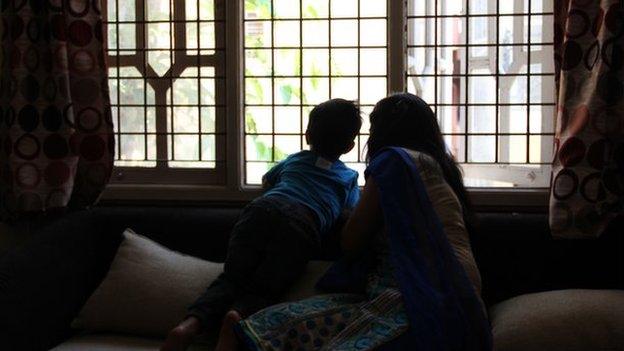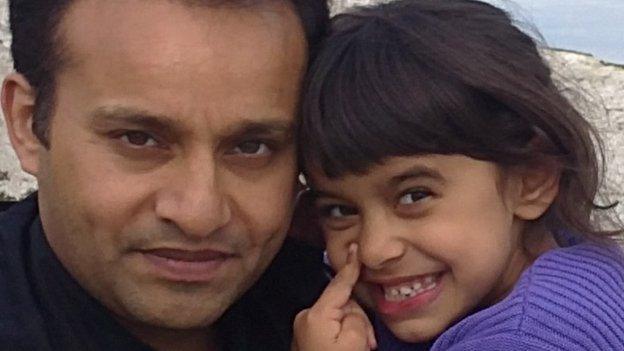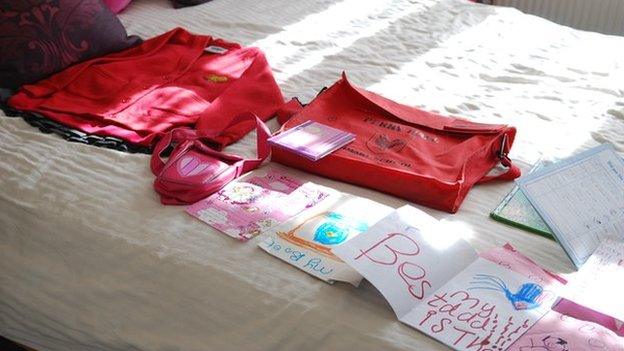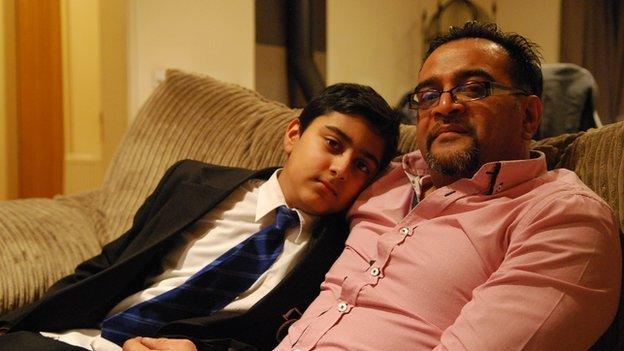The mother who abducted her own child
- Published

The number of British children abducted by their parents and taken abroad has risen dramatically. There's a huge emotional cost for all involved.
One day, Ami asked her parents to buy flights to India for her and her son, Anish. With that she became an international child abductor.
Ami doesn't accept this title but says she was aware she was breaking the law. "I knew there would be consequences," she says, hesitantly. "But what the consequences would be, I did not know."
Ami is one of a growing number of parents who have abducted their own child by taking them overseas.
UK cases of international child abduction and custody battles have increased dramatically. According to figures obtained under the Freedom of Information Act, there were 477 recorded cases in 2014 - more than double the 2005 figure of 226.
The charity Reunite International, external thinks the actual figure is even higher - its helpline took 17,000 calls in 2014.

Safraz Khan's daughter Aamina was taken by her mother
More problematic is the increase in abduction to countries not signed up to the Hague convention - an international agreement on the quick return of children. It means there is little UK authorities can do. Pakistan and India were the most common non-Hague destinations, followed by Somalia, Nigeria and Egypt.
More relationship break-ups, ease of travel and an increase in cross-border relationships are the main reasons cited for the rise. Trying to get them back isn't easy.
It's been a long wait to meet Ami, 32, and three-year-old Anish (their names have been changed because she doesn't want her ex-husband to know she's speaking to us).
Before we get to her house in the suburbs of Bangalore we've been speaking over email and the phone for more than a year, building trust so that Ami was willing to tell us why she abducted her own son two years ago.
We meet at the small house Ami and Anish now share with Ami's parents. Her mother gets emotional as Ami recounts what happened to her. She had married a British Indian man, who she met on an online Asian matrimonial site. Ami says initially he seemed like a perfect match, she moved to the UK to live with him and got pregnant quicker than expected.
But Ami says her husband became controlling and would isolate her. He wouldn't talk to her and wouldn't let her talk to her family.
Ami says she feels her husband is still controlling her and her son's lives from the UK
"I would call my parents and my mum would be crying. She would be asking me, 'How are you? We haven't heard from you. And we call your husband - he says you're not available.'"
Their relationship fell apart. Ami's husband said he wanted a divorce and she says she feared he would try and take her child away. In the end Ami left the house leaving in a note saying she was going to stay with friends. But after a few weeks, far from home, she says she ran out of people who could help.
"I had nowhere else to go," says Ami. She says all she could think about was finding a place for her and her son to live together.
"I thought, I cannot go back to my property with my husband. I would end up losing my child. The only place I could see was my parents' home. I had nowhere else to go. I exhausted all my energy, all my willpower, my confidence. I was completely broken."
Now Ami is stuck. She doesn't want to come back to the UK and so is trying to get custody of Anish through the Indian courts. Her ex-husband knows where she is - she has to report to court in Bangalore every two weeks and there is an order telling her to return to the UK.
In cases like this it's not always obvious who is to blame - many details are only known by the two people involved in the relationship - but in the end, it's the children who suffer the most.

Aamina's school uniform is still laid out on her bed
Safraz Khan knows this only too well. His daughter Aamina was kidnapped by her mother four years ago. He has travelled to Pakistan five times to look for his daughter because there are records of her and her mother entering the country. But he still has no idea where she is.
He says he feels totally helpless. All he has is a court order demanding Aamina's mother and her family members bring her back or provide information. He says the courts and the police expect him as the parent to go to Pakistan, find his child and then let them know."
When we meet him at his house in South London he takes us up to her bedroom where her school uniform is still laid out on the bed, alongside teddies and schoolwork - just as they were the day she went missing.
It's something of a shrine to his daughter, awaiting the day she comes home that Safraz so desperately hopes will come. "When she does I want her to know I've never stopped thinking about her."
The strain this is putting on Safraz is plain. "The loss that I'm facing is like a bereavement. I don't have a grave - God forbid - but I don't have anything. In four years I've heard nothing, nothing."
Safraz is left waiting, worried his daughter will forget who is. He has re-married and had two more children but says it's harder to bond with them because of the loss of Aamina.
But he feels as a father he's not got the sympathy a mum may have got in the same situation. There is a perception that it's largely fathers who abduct their own children, but according to Reunite 70% of parents who carry out abductions are mothers.

Mohammed Sheikh and his son Rameez
In some cases these children do come home - but the experience leaves a mark. We noticed the CCTV as soon as we arrived at the home of Mohammed Sheikh in Leicester, mostly because the same cameras were at Safraz's house. Mohammed is another father whose child had been abducted.
Inside, his 11-year-old son Rameez plays on his computer and his dad delivers him a milkshake and breakfast as he competes with a friend on Call of Duty. Mohammad dotes on his son. He lives in constant fear of him being taken away again.
"The moment his mum arrives to pick him up or drop him off I'm watching on the cameras. Every time he's with her I worry and I always will."
Rameez was kidnapped by his mother, Mohammed's ex-wife, and taken to the United Arab Emirates when he was five.
Because the country has not signed up to the Hague convention there was no system in place to locate Rameez and get him back. Sitting at the kitchen table, piles of court documents in front of him, Mohammad explains to how he started his own search.
"I used any means possible. I sent an email to his mum and there's a way of tracing an email, it's not illegal, so that's what I did. I got an IP address for somewhere in Sharjah in the UAE so I contacted my cousin in Dubai. He went over, located them and followed them home."
Mohammed now has full custody of his son, but the boy still sees his mother. Mohammed says he doesn't want Rameez to ever resent him for keeping him away from her so they have limited contact. But Rameez is scared of going on trips with her in case she takes him away again - he takes a friend if they do "because she can't take us both".
And Ami knows she'll have to explain where Anish's father is one day. "Right now he doesn't ask me anything about this," she explains just before we leave. 'But eventually he will and I have to be prepared to face it."
Subscribe to the BBC News Magazine's email newsletter to get articles sent to your inbox.